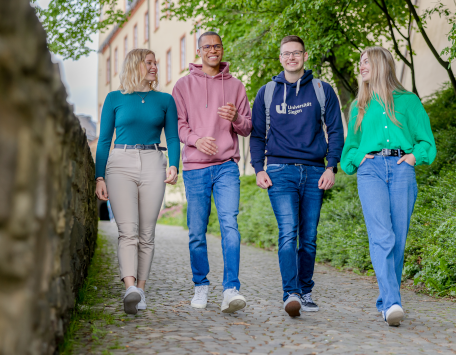Upwards in tandem
Interview with Prof. Dr. Yasmin Temelli and Marta Röder
Marta Röder is a doctoral student in Romance Studies and a participant in Women's Mentoring Siegen (FraMeS). The combination of workshops, training and networking has proven its worth. The important thing is that each participant (mentee) chooses a mentor herself or himself during the one-year program based on her or his area of expertise.
Marta Röder's mentor is the Romance studies professor Dr. Yasmin Temelli. Marta Röder only has to knock a few doors down if she wants to speak to her mentor. The two
know each other well. But as a mentor, Prof. Temelli can give her a different perspective on her work and on herself as a person, explains the doctoral student.
Ms Röder, you studied Spanish and History at the University of Siegen and are working on your doctorate. Why are you taking part in the women-specific mentoring program?
Röder: I am actually already in the final phase of my doctorate. My doctoral supervisor, Prof. Dr. Dagmar Abendroth-Timmer, drew my attention to the program at an early stage of my doctorate. However, I was looking for the right moment to be able to use the input from this program to my advantage. That moment came
This moment came last year, when I was increasingly working on defining my own profile as a researcher, i.e. as a woman and as a cultural didactician.
What is particularly helpful?
Röder: The exchange with other female academics is important to me. We have very different professional backgrounds, but the discussions and workshops, for example on female leadership, are very helpful. In addition, the impulses from the workshops and the exchange with Ms. Temelli helped me to find my own position within my discipline. I kept asking myself whether I really fit in because of my interdisciplinary work. However, the changes over time have shown me that I have chosen exactly the right path with the focus of my doctorate, which follows a cultural-historical approach and is geared towards the prevention of anti-Semitism in foreign language teaching.
Prof. Temelli, you are now a mentor, but you yourself took part in a similar mentoring program as a doctoral student at the University of Düsseldorf. Do you share Marta Röder's experience?
Temelli: In fact, the exchange with other female scientists was the most important thing for me at the time. To see that other female doctoral students were asking themselves similar questions and that you are not alone with some of your doubts. For example, if you are not a member of a research training group, but a "lone fighter", then it can be beneficial to exchange ideas in a competition-free space.
exchange ideas in a non-competitive space.
How did the two of you come together?
Röder: At first, I thought about whether it would be better to look for a mentor outside of my own Schools whose work I had already been involved with. But then I thought it made more sense to work with someone I know and who I know can really help me. So I decided to ask Ms. Temelli to be my mentor.
And it was an easy decision for you to become a mentor?
Temelli: I know and appreciate Marta Röder very much, so it was easy for me to agree to be a mentor. Basically, the idea of supporting young and talented people is very important to me - regardless of whether they are women or men. It's an honorable task and when you hold a position at the university that offers so many opportunities to shape things, I think it's also important to give something back and get involved.
What is the importance of building networks, especially for women?
Temelli: I find it a little difficult to talk about building a network specifically for women. I certainly understand the motive, because there is of course the idea that men
tend to get together and support each other. It is certainly very helpful for women to exchange ideas and make contacts as part of support programs. But
I have my doubts as to whether such a network can necessarily successfully counter inequalities. Your subject, Romance studies, tends to be female-dominated. Perhaps women in other subjects hit the so-called "glass ceiling" more quickly.
Röder: That's true. In our Romance Studies department, all four professorships are held by women. This makes us a real beacon in Siegen. The situation is different in other disciplines.
Temelli: It may be that the situation is different in other subjects. In any case, I never came up against this 'glass ceiling', but was able to succeed in this system and am very grateful for that. Of course, there are and always have been (university) networks. But from my experience, I can't say that it's a case of man against woman. Which is not to say that these cases don't exist, I just haven't experienced it myself.
What advice would you give Marta Röder and other young female scientists?
Temelli: It doesn't work without absolute curiosity, sound knowledge and great ambition. You also have to be honest: At a certain point, luck plays a not insignificant role.
I know quite a few people who are good in their field and would have deserved a professorship, but didn't make it, because the bottleneck in science is tight. In the free economy
You can become successful in many different ways in the free economy, but not in academia. For those who choose science, it must be a vocation.
This article appeared in issue 2/2025 of the university newspaper Querschnitt.

